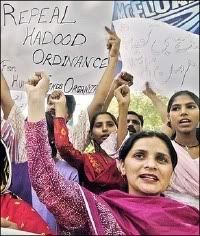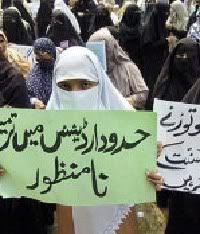 The women’s protection bill of Pakistan — which will dramatically alter the rape laws of Pakistan — has a chance of being passed this coming Monday. The bill is an attempt to reform the draconian rape laws of Pakistan from 1979, passed by then dictator Zia ul Haq under the auspices of the religious establishment (part of the hudood ordinance).
The women’s protection bill of Pakistan — which will dramatically alter the rape laws of Pakistan — has a chance of being passed this coming Monday. The bill is an attempt to reform the draconian rape laws of Pakistan from 1979, passed by then dictator Zia ul Haq under the auspices of the religious establishment (part of the hudood ordinance).


This has been a contentious issue in Pakistan (see my commentary on it here). I have been in correspondence with individuals who are involved in the Women’s Protection Bill. While on one hand they have had to contend with the religious establishment, they have also ran into opposition by some liberal groups, and international NGO’s like Human Rights Watch, who find the proposed amendments inadequate.
What the reformists are trying to explain, however, is that while total repeal of the bill would be wonderful, politics is a process, and that means taking whatever progress that can be gotten right now. While concerns about the fact that the bill is being pushed through by a dictator (Musharraf) are valid, they are unfair in light of the tremendous abuses that will be alleviated if this bill is passed. In the short term, the reformists — and those backing the bill — need our support. Later, more progress can be made.
In an op-ed that appeared in The Daily Times today (10 September, 2006) Feisal Naqvi points out:
…the response from women’s groups to the proposed Women’s Protection Act has either been hostile or at best, tepid. Instead of supporting the bill, women’s groups have only reiterated their demand for the complete repeal of the Hudood Ordinance. What these groups forget is that politics is the art of ‘the possible’. The Women’s Protection Act may not be perfect but it will certainly bring relief to millions of oppressed women. In any event, the fight for repeal can always be carried on later.
The reformists need to be recognized for the good they have achieved despite the enormous difficulties, and not to be criticized for what they have failed to achieve. The full article by Feisal Naqvi in The Daily Times is worth a read because it clearly explains what the issues are and how they are being dealt with in the new law. It concludes:
If all goes according to the government’s plan, much of what is undesirable in the Offence of Zina (Enforcement of Hudood) Ordinance, 1979 (to give the law its full name) will be quietly gutted through the proposed Protection of Women’s Act… The proposed law marks the absolute limit of what is possible in terms of today’s political climate. More importantly, the Protection of Women’s Act is not a whitewash job: instead, it addresses and fixes the major sources of women’s oppression under the Hudood Ordinance.
The best thing to do right now is to support the efforts of the reformists and later carry their torch further. It would be a terrible tragedy if after decades of efforts the amendments were tabled due to inadequate support by progressives. Well intentioned people around the world need to express their support. (For more see: ‘The Right To Own Women’ and Women’s Protection Bill Cheat Sheet). [Also see earlier ATP Poll on related issue].
Ali Eteraz describes himself as “a continental philosopher, essayist, novelist, student of Islamic arts, philosophy, jurisprudence and a practitioner of global nomadism” and blogs under this pseudonym at Eteraz, where you will find much on this and related subjects.




















































As long as I see some women protesting against the repeal of Hudood Ordinance, I would guess that all is not what meets the eye.
I was researching about the case and one thing that kept coming up was Safia Bibi case. What I recall was that whatever the sentence by lower court, it was overturned by superior court appellate bench and she was let free. But nobody seems to mention this. Obviously, she was let free under the same Hudood Ordinance.
Moreover, nobody mentions the statistics about how many men have been sentenced under the ordinances and how many women. If more men are there, then apparently the ordinance is not biased against women. And what I have read somewhere, the number of men is significantly higher than number of women. And if people are languising in jails awaiting their trial under Hudood Ordinance, then the ordinance is not to blame rather the justice system is to be blamed.
I have seen in a lot of instances where the corruption of police and bureaucracy renders the justice system useless. I hope the same is not the case for repealing Hudood Ordinance.
[quote comment=”2423″]I have read the references and the background material. Please don’t assume others have not. Maybe, like me, they also did not find them convincing.
Since, in your puritan vision, women who are either “fat”, “aged” or “divorced” are automatically “filthy”, I am not sure this conversation can go anywhere.
May Allah bless you. And may no one close to you ever get “fat” “aged” or “divorced”.[/quote]
Ignorance is the bliss?Why then do you blame to mullahs who are also dont find “convincing” your version?
BTW,I agree that those ammendments are really not convincing anyway.Whining about him,her etc doesnt make a law “reliable”
[quote comment=”2423″]I have read the references and the background material. Please don’t assume others have not. Maybe, like me, they also did not find them convincing.
Since, in your puritan vision, women who are either “fat”, “aged” or “divorced” are automatically “filthy”, I am not sure this conversation can go anywhere.
May Allah bless you. And may no one close to you ever get “fat” “aged” or “divorced”.[/quote]
There is no need to get emotional and twisting them.You know very well who were being targetted.
I have read the references and the background material. Please don’t assume others have not. Maybe, like me, they also did not find them convincing.
Since, in your puritan vision, women who are either “fat”, “aged” or “divorced” are automatically “filthy”, I am not sure this conversation can go anywhere.
May Allah bless you. And may no one close to you ever get “fat” “aged” or “divorced”.
It is sad to note that you find legal language
Excuse me Its not ME ,the issue was raised by people who are willing to alter that clause.Such silly ammendment cant protect women.Did you read the link before commenting here?
What is the relevance between F-16s and this bill’s acceptance?
Bilal hope you wouldnt come up with this statment that there is no US influence on our policies?I posted this Old guardian link.Read how frustrated is the general when US was not backing him his coup back in 2001.
Read the statment of Talat Masood.Though sacking Taliban was supportedby me back in 2000 but heck it was also a US pressure which converted a ‘friend’ into a ‘foe’.
His action against Madrassahs,proposing controversal syllabus;there are many Instance which were/are backed by US.So why am I or others cant think on similar lines about this ammendment which really not making any changes in fate of women.
what makes you think the women supporting this bill are also not the same women who are fighting against Karo kari and the other crimes against women that you mention?
Ground reality What else?What those infinite NGOs has done?Beside cashing the tragic incidents against women(e;g Mukhtaran Mai).
Bilal unlike you and many alike,i dnt believe in words of what others say rather see what is happening around me.All I know that fudals still exist,they torture women more than torture happens due to “tht hudood ordininance”.Read Blashphemy of Themina Durrani ,it really opnes eyes that how those fudals who are in politics a s well making literally bad imge of Pakistan and Islam.
What do you propose be done with the Hudood Ordinance? How do you propose it should be handled, and deliberated in the present legislative setup?
There is always a need of changing laws.Hudood law comprised of Two sections;one laws 100% based on quran 2)laws who was based of misinterpetition of Quran. The second part really needs changes but not silly changes which proposed by the concerned party.
I say again the orignal law and new law is not gonan change fate of WOMEN anyway.If you people are really willing to change fate of women then force those fat aged divorced women who has been living in big banglows,who come out to cash those poor women to get some money from donators.There should be real crack against those filthy elements and offcourse against those who are responsible for KaroKari etc.
I assume that you can read urdu.Visit the link i had provided on above posts.Read them carefully then comment.
Adnan,
Your anger seems to be preventing you from making coherent arguments (or statements). It is sad to note that you find legal language that would decide the lives and deaths of many people to be “damn funny”. It may not be a bad idea to chill out a bit, then go back and read what you wrote above, and see if you still think it would make sense to someone who is not feeling the particular anger & frustration you seem to have developed on this issue.
What is the relevance between F-16s and this bill’s acceptance? If you think this bill is being pushed to appease the US, then forget your attempts at sarcasm and just say so. Hopefully you will have some proof for that. And what makes you think the women supporting this bill are also not the same women who are fighting against Karo kari and the other crimes against women that you mention? I hardly see the religious leadership in Pakistan doing much about those crimes, unfortunately. And your reference to airconditioned rooms is a bit childish, really. I used to use the same “runner”/cliche statements a few years ago and sort of grew out of it.
What do you propose be done with the Hudood Ordinance? How do you propose it should be handled, and deliberated in the present legislative setup? I look forward to your carefully formulated thoughts. I would follow your blog in case you choose to post it there.